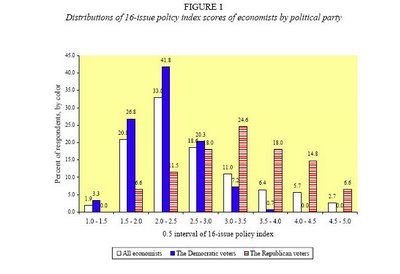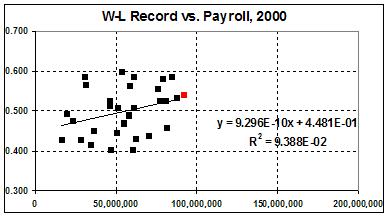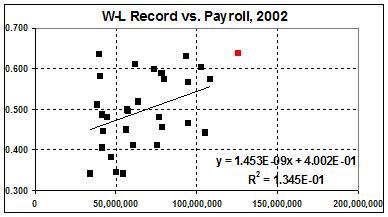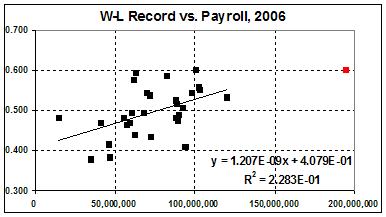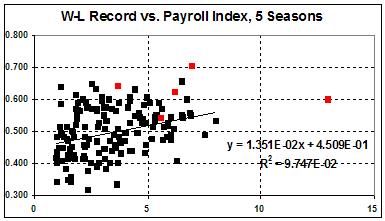UPDATED, 10/16/07 and 10/28/07 With the ascension of the wild-card Detroit Tigers and mediocre St. Louis Cardinals (83-78 WL record) to their respective league championships in 2006, and with the triumph of the wild-card Colorado Rockies in 2007, it's time to take stock of divisional play and the wild-card designation. Since the advent of divisional play in 1969, and especially with the introduction of wild-card teams in 1995, league championships often have not been won by the best team. Here's the whole story:
From 1901 (the American League's first year) through 2006 each league has had 106 champions (with the outcome of this year's AL race still pending). (There were no champions in 1994, when the baseball season ended early because of a players' strike.) From 1901 through 1968 each league's champion was the team with the best regular-season record; there were postseason playoffs only when two teams tied for the league's best record.
From 1969 onward the leagues have been split into divisions, and league championships have been determined by postseason play. League championships were determined in one round of postseason play from 1969 through 1993, when there were only two divisions in each league. (There was an exception in 1981, when a midseason strike led to the declaration of "first half" and "second half" winners in each leagues' two divisions. That necessitated an extra round of postseason play to determine overall division champions.)
From 1995, the first year of postseason play after each league was split into three divisions, it has taken two rounds of postseason play to determine a league's champion. The extra round accommodates the addition of a third division champion and a "wild card" team -- the second-place team with the best record among the three second-place teams in a league.
Twenty-one times in the 39 seasons of regular postseason play (1969-2007, less 1994), the National League pennant has been won by a team that did not have the best regular-season record. The same thing has happened 16 times in the American League, through 2006. It is because of such results that I have expressed (elsewhere) my disdain of postseason play as an indicator of excellence.
The following tables summarize the results for each team. The first pair of tables gives the number of times, beginning with 1901, that each team has led its league in championships and had the best record. The second pair indicates the years in which a team won its championships and whether or not it also had the league's best record in those years. (Franchises that have been located in more than one place (e.g., the Los Angeles Dodgers) are identified by their current location.)
NATIONAL LEAGUE - CHAMPIONSHIPS/BEST RECORD/NUMBER OF SEASONS (FIRST SEASON*) - 1901-2007
Arizona: 1/1/10 (1998)
Atlanta: 9/13/107
Chicago: 10/12/107
Cincinnati: 9/9/107
Colorado: 1/0/15 (1993)
Florida: 2/0/15 (1993)
Houston: 1/2**/46 (1962)
Los Angeles: 18/16/107
Milwaukee: 0/0/10 (1998)
New York: 4/4/46 (1962)
Philadelphia: 5/3/107
Pittsburgh: 9/12/107
San Diego: 2/0/39 (1969)
San Francisco: 18/17/107
St. Louis: 17/18**/107
Washington: 0/1***/39 (1969)
__________
* If not in the league in 1901.
** Houston and St. Louis tied for best record in 2001.
*** Montreal (now Washington) had the best record in the strike-shortened 1994 season.
AMERICAN LEAGUE - CHAMPIONSHIPS/BEST RECORD/NUMBER OF SEASONS (FIRST SEASON*) - 1901-2007
Baltimore: 7/9/107
Boston: 12/10****/107
Chicago: 6/8/107
Cleveland: 5/6****/107
Detroit: 10/10/107
Kansas City: 2/1/39 (1969)
Los Angeles: 1/0/47 (1961)
Milwaukee (as AL team): 1/1/30 (1969-97)
Minnesota: 6/5/107
New York: 39/39***/107
Oakland: 15/16**/107
Seattle: 0/1/31 (1977)
Tampa Bay: 0/0/10 (1998)
Texas: 0/0/47 (1961)
Toronto: 2/3**/31 (1977)
__________
* If not in the league in 1901.
** Oakland and Toronto tied for best record in 1992.
*** New York had the best record in the strike-shortened 1994 season.
**** Boston and Cleveland tied for best record in 2007.
NATIONAL LEAGUE - YEARS IN WHICH EACH TEAM WON THE CHAMPIONSHIP
Arizona Diamondbacks* (1 league championship)
2001 (best record: Houston and St. Louis tied)
Atlanta Braves (formerly Milwaukee Braves and Boston Braves) (9)
1914, 1948, 1957, 1958, 1991 (best record: Pittsburgh), 1992, 1995, 1996, 1999
Chicago Cubs (10)
1906, 1907, 1908, 1910, 1918, 1929, 1932, 1935, 1938, 1945
Cincinnati Reds (9)
1919, 1939, 1940, 1961, 1970, 1972 (best record: Pittsburgh), 1975, 1976, 1990 (best record: Pittsburgh)
Colorado Rockies* (1)
2007 (best record: Arizona)
Florida Marlins* (2)
1997 (best record: Atlanta), 2003 (best record: Atlanta)
Houston Astros (also Houston Colt 45s)* (1)
2005 (best record: St. Louis)
Los Angeles Dodgers (formerly Brooklyn Dodgers, Brooklyn Robins, and Brooklyn Superbas) (18)
1916, 1920, 1941, 1947, 1949, 1952, 1953, 1955, 1956, 1959, 1963, 1965, 1966, 1974, 1977 (best record: Philadelphia), 1978, 1981 (best record: Cincinnati), 1988 (best record: New York)
Milwaukee Brewers* (0) (see also AL listing)
New York Mets* (4)
1969, 1973 (best record: Cincinnati), 1986, 2000 (best record: San Francisco)
Philadelphia Phillies (5)
1915, 1950, 1980 (best record: Houston, 1983 (best record: Los Angeles), 1993 (best record: Atlanta)
Pittsburgh Pirates (9)
1901, 1902, 1903, 1909, 1925, 1927, 1960, 1971, 1979
San Diego Padres* (2)
1984 (best record: Chicago), 1998 (best record: Atlanta)
San Francisco Giants (formerly New York Giants) (18)
1904, 1905, 1911, 1912, 1913, 1917, 1921, 1922, 1923, 1924, 1933, 1936, 1937, 1951, 1954, 1962, 1989 (best record: Chicago), 2002 (best record: Atlanta)
St. Louis Cardinals (17)
1926, 1928, 1930, 1931, 1934, 1942, 1943, 1944, 1946, 1964, 1967, 1968, 1982, 1985, 1987, 2004, 2006 (best record: New York)
Washington Nationals (formerly Montreal Expos)* (0)
AMERICAN LEAGUE - YEARS IN WHICH EACH TEAM WON THE CHAMPIONSHIP
Baltimore Orioles (formerly St. Louis Browns and original Milwaukee Brewers) (7)
1944, 1966, 1969, 1970, 1971, 1979, 1983 (best record: Chicago)
Boston Red Sox (12)
1903, 1904, 1912, 1915, 1916, 1918, 1946, 1967, 1975 (best record: Oakland), 1986, 2004 (best record: New York), 2007 (best record: tied with Cleveland)
Chicago White Sox (6)
1901, 1906, 1917, 1919, 1959, 2005
Cleveland Indians (also Cleveland Naps, Cleveland Bronchos, and Cleveland Blues) (5)
1920, 1948, 1954, 1995, 1997 (best record: Baltimore)
Detroit Tigers (10)
1907, 1908, 1909, 1934, 1935, 1940, 1945, 1968, 1984, 2006 (best record: New York)
Kansas City Royals* (2)
1980 (best record: New York), 1985 (best record: Toronto)
Los Angeles Angels of Anaheim (formerly Anaheim Angels, California Angels, and Los Angeles Angels) * (1)
2002 (best record: New York)
Milwaukee Brewers (now NL; formerly Milwaukee Brewers (AL) and Seattle Pilots (AL))* (1)
1982
Minnesota Twins (formerly the original Washington Senators) (6)
1924, 1925, 1933, 1965, 1987 (best record: Detroit), 1991
New York Yankees (formerly New York Highlanders and original Baltimore Orioles) (39)
1921, 1922, 1923, 1926, 1927, 1928, 1932, 1936, 1937, 1938, 1939, 1941, 1942, 1943, 1947, 1949, 1950, 1951, 1952, 1953, 1955, 1956, 1957, 1958, 1960, 1961, 1962, 1963, 1964, 1976, 1977 (best record: Kansas City), 1978, 1981 (best record: Oakland), 1996 (best record: Cleveland), 1998, 1999, 2000 (best record: Chicago), 2001 (best record: Seattle), 2003
Oakland Athletics (formerly Kansas City Athletics and Philadelphia Athletics) (15)
1902, 1905, 1910, 1911, 1913, 1914, 1929, 1930, 1931, 1972, 1973 (best record: Baltimore), 1974 (best record: Baltimore), 1988, 1989, 1990
Seattle Mariners* (0)
Tampa Bay Devil Rays* (0)
Texas Rangers (formerly expansion Washington Senators)* (0)
Toronto Blue Jays* (2)
1992 (best record: tied with Oakland), 1993



























